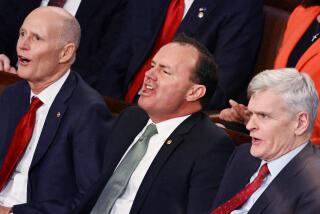Bipartisan Panel Fails to Back Any Red-Ink Remedy : Budget: Commission only votes to ask Clinton to seek entitlement program reforms. Plan to raise eligibility age fails to win endorsement.
- Share via
WASHINGTON — Hamstrung by political sensitivities, a bipartisan commission Wednesday failed to agree on a plan to restrain the federal budget deficit, instead voting to ask President Clinton and Congress to strive for eventual reforms in Social Security, Medicare and other entitlement programs.
“If we delay action now, the choices will be higher taxes for Americans still in the work force or larger benefit reductions to retirees,” members of the Bipartisan Commission on Entitlements and Tax Reform said in a letter to Clinton after acknowledging their inability to agree on a plan with tough choices.
Under determined attack from labor and senior citizen groups, the commission failed to muster a majority for the controversial plan offered by its chairmen, Sens. Bob Kerrey (D-Neb.) and John C. Danforth (R-Mo.). The senators wanted to raise the eligibility age for Social Security and Medicare to 70 in the year 2034, cut Social Security payroll taxes and require all Americans to use the tax savings to open mandatory private savings accounts.
In a news conference before Wednesday’s final commission meeting, John Rother, public policy director of the American Assn. of Retired Persons, the nation’s largest senior group, said he was “appalled” that Kerrey “continues to use seniors as the scapegoat for our nation’s deficit problem.” Larry Smedley, executive director of the National Council of Senior Citizens, said the commission is trying to “sacrifice our children or grandchildren on the altar of voodoo economics.”
But Kerrey, undaunted by the attacks and the failure to get the 20 votes needed to make his plan an official recommendation, vowed after the three-hour meeting to take his campaign to the American people to make major changes in Medicare and Social Security. “Our true objective is to change the law,” Kerrey said.
The 32-member commission--which includes 20 members of Congress, several private citizens, Gov. Roy Romer of Colorado and Mayor Sandra W. Freedman of Tampa--voted, 24 to 6, to send the letter to Clinton, warning about a growing disparity between federal spending and tax revenues.
By the year 2012, combined spending for entitlements--including Social Security, Medicare, Medicaid, federal pensions, welfare and farm price supports--and interest on the national debt will consume all revenues, leaving nothing for other federal programs, according to the commission.
Kerrey and Danforth said their plan to slow the growth in Social Security and Medicare spending would keep the deficit at about 2.5% of the nation’s economic output. Otherwise, the programs would consume an ever-growing share of resources. But the commission’s critics deny that there is an impending crisis. They note that Social Security, collecting more tax revenues than it pays out in benefits, is not projected to have a problem until 2025. The only short-range threat comes from Medicare, whose hospital insurance fund is projected to become bankrupt in 2001. Dealing with health care inflation will avert a crisis, Kerrey’s opponents insist.
“Where is the crisis that justifies these Draconian cuts?” said Richard Trumka, president of the United Mine Workers of America, one of the dissenters who refused to sign the letter to Clinton. Rather than making drastic changes in Social Security now, the “enemy is rapid health care inflation in both the private and public (sectors),” said Smedley, of the senior citizen group. He is chairman of the Leadership Council of Aging Organizations, which joined the denunciation of the Kerrey-Danforth plan.
The political delicacy of the issue was underlined by the identity of the two commission members who failed to vote Wednesday: Rep. Bill Archer (R-Tex.), who will be chairman of the House Ways and Means Committee, and Sen Daniel Patrick Moynihan (D-N.Y.), who will be ranking member of the Senate Finance Committee.
Their committees handle Social Security legislation. They apparently thought that issue had such potential for controversy that they refused to sign the letter to Clinton, even though it essentially did no more than underscore the seriousness of the long-term problem.
More to Read
Get the L.A. Times Politics newsletter
Deeply reported insights into legislation, politics and policy from Sacramento, Washington and beyond. In your inbox twice per week.
You may occasionally receive promotional content from the Los Angeles Times.









